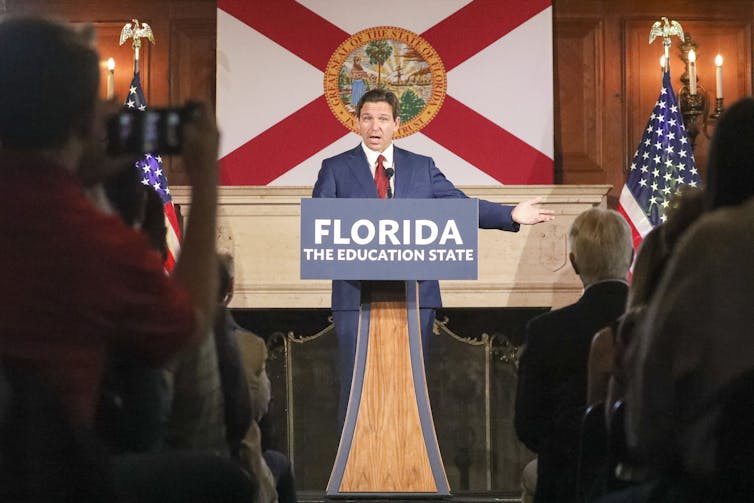Guess What? Mem Fox’s children's book was banned in Florida over 'nudity' – but bathing is not a sexual act
- Written by Sarah Mokrzycki, Lecturer, Victoria University

EDITOR’S NOTE: Since this article was published, officials in Duval County, Florida, have denied the book was formally banned. The book does not appear among the 21 books listed as “not approved” on the Duval County Public Schools website. However, it does feature on a list of books reported as having been removed from school libraries, on the grounds that it contravened a state law banning the distribution to children of material that “depicts nudity or sexual conduct”. The list, of which The Conversation has obtained a copy, was the result of a Florida Department of Education survey of school districts, as part of the state’s mandated review of school books. The Conversation acknowledges the work of the Florida Freedom to Read Project in investigating this issue.
Australian author Mem Fox’s 1988 picture book Guess What?, illustrated by Vivienne Goodman, has been banned in Duval County, Florida over allegations of “pornography”. Why? Because one illustration depicts the main character, “old witch” Daisy O'Grady, taking a bath.
The picture book, which invites children to guess Daisy’s witchy identity through a series of clues, joins a plethora of titles – mostly with LGBTQIA+ or culturally diverse themes – that have been removed from school libraries in the state.
Fox is one of Australia’s most beloved authors: her first book, Possum Magic, is one of Australia’s bestselling ever children’s books, with sales of over four million (and counting). Her agent told the Guardian, “We have nothing to say on this issue. Duval County is a county of 997,000 people in Florida. It is not important.”
The banning comes on the heels of new legislation, enacted in 2022, that has seen many Florida schools strip their library shelves and cover up books in classroom libraries for fear of breaching the law – and risking a prison sentence.
Under Section 847.012 of the Florida statutes, materials prohibited in schools include:
Any picture […] or visual representation of a person or a portion of a human body which depicts nudity or sexual conduct, sexual excitement, sexual battery, bestiality, or sadomasochistic abuse and which is harmful to minors.
Failure to comply is a third-degree felony, which can carry a prison sentence of up to five years.
The full criteria can be found in the department’s online training slideshow but, simply put, all books must be age appropriate and “free of pornography”. However, what constitutes both “appropriate” and “pornography” – and how this is decided – remains unclear.
Read more: Teacher sacked for reading bum book to students: the latest conservative book ban
Bodies are not ‘inherently sexual’
So how exactly does Guess What? fit these parameters?
In one illustration, Daisy sits across a double bowl sink (that she is comically too big to fit in) wearing a scuba mask. The bowls are filled with water, and she sits sideways in one with her feet splashing in the other. She is nude, but not exposed. Limbs cover her breasts and genitalia. The room is busy and pleasantly chaotic: soap on the floor, a frog on a towel, fish pegged to the clothesline that hangs over the sink.
It’s far from a sexual image. Unless you’re into that sort of thing. In which case, we are no longer talking about the “prevailing standards in the adult community”, but rather a personal sexual preference or “kink” (a word I never thought I would write in relation to a Mem Fox picture book).
What the issue comes down to is a blatant conflation between nudity and sexuality. The statute’s wording is highly problematic: nudity in and of itself is not a sexual act. Bathing is not a sexual act. It’s basic hygiene. By banning books with any form of nudity in a bid to rid school libraries of “pornographic content”, the statute situates all nudity as a form of pornography.
The irony, of course, is that by trying to shelter children from sex – and from material that “sexualises students” – the law itself is sexualising children’s bodies. By implying that nudity in a non-sexual context is “pornographic”, the Florida government and Department of Education is teaching children that their bodies are inherently sexual.
Australian attempted book bans haven’t worked
In some ways, this ban could be considered as an example of differing social standards between Australia and the United States. Earlier this year, Maia Kobabe’s graphic memoir Gender Queer was pulled from a Queensland library after complaints by a conservative activist.




